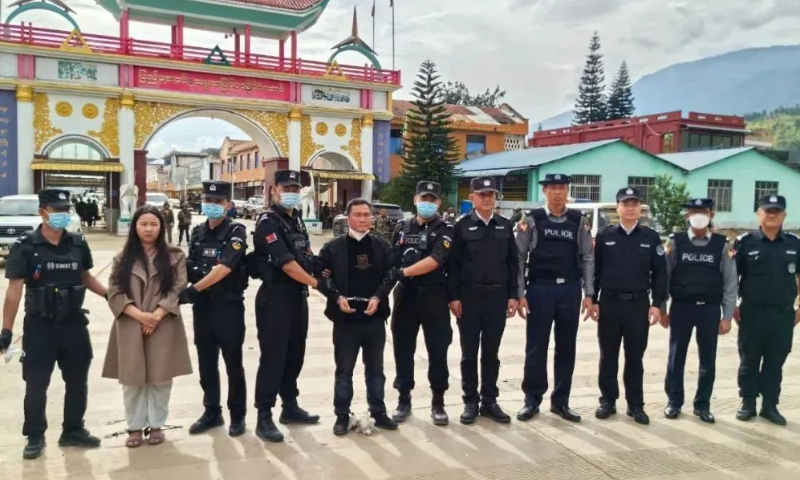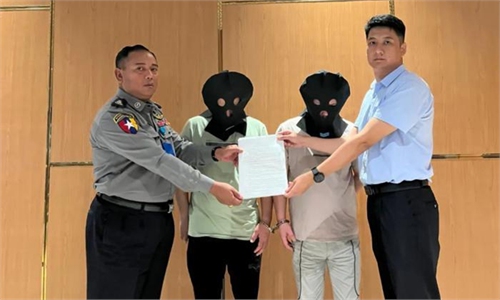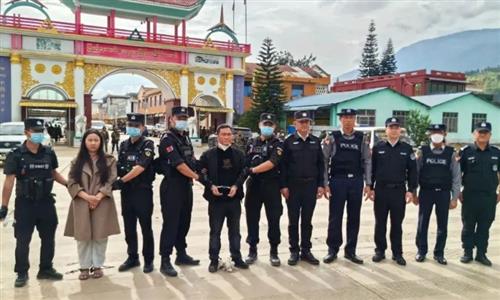Over 34,000 people prosecuted for telecom, online fraud in first 10 months of 2023: China’s top procuratorate

Telecom fraud suspects are handed over to Chinese police Photo: WeChat account of the Criminal Investigation Bureau of the Ministry of Public Security
For the first 10 months this year, China's procuratorial organs prosecuted over 34,000 individuals involved in telecom and online fraud, an increase of nearly 52 percent compared with the same period last year, China's top procuratorate announced on Thursday.
The Chinese government has doubled down on efforts to crack down on telecommunications and online fraud, the number of prosecutions for telecommunications and online fraud has shown a significant upward trend recently, the Supreme People's Procuratorate said.
It revealed that from January to October 2023, procuratorial organs nationwide have prosecuted over 34,000 individuals involved in telecommunications and online fraud, an increase of nearly 52 percent compared with the previous year.
In addition, prosecutions for crimes against national border [frontier] control have rapidly increased, becoming a common charge related to the telecommunications and online fraud crimes.
Although perpetrators are generally young people with low income and poor education background, proportion of well educated people involved in those offenses are increasing. The top procuratorate said that in the first three quarters of this year, a total of 7,600 people with PhD degree, 5,900 with master degree participated in telecom and online fraud, or assisting and facilitating such crimes.
The Supreme People's Procuratorate also publicized several telecom fraud cases on Tuesday. For example, seven Chinese stole into Myanmar in 2020 claiming they were seeking romantic relationships, and they then lured victims to gambling websites to commit fraud, deceiving a total of 26 victims out of more than 8.4 million yuan ($1.18 million). Those criminals were sentenced by Shanghai court up to four years and a half, with fines.
Recently, China has strengthened its effort to combat telecom and online fraud. In November, Chinese public security authorities strengthened their cooperation with Myanmar in the border area to intensify the offensive against telecom and internet fraud in northern Myanmar. Several ringleaders of telecom fraud, including Ming Guoping, Ming Julan and Ming Zhenzhen, were apprehended and handed over to China, while another ringleader, Ming Xuechang, committed suicide after being captured.
Chinese law enforcement agencies are facing difficulties in gathering evidence, confiscating assets, and making arrests for perpetrators of telecom and online fraud, due to the fact that most of the suspects involved in telecommunications fraud are located overseas. The websites, servers, and storage media are also located abroad, Zhu Wei, a vice director of the Communication Law Research Center at the China University of Political Science and Law, told the Global Times.
However, the recent operations against the Ming family demonstrates that China's firm determination and capacity in cracking down on individuals involved in telecom fraud, especially criminal syndicates. These efforts have yielded positive results, and it is believed that they will serve as a deterrent to other overseas suspects involved in telecommunications fraud.
The Supreme People's Procuratorate stated that authorities will further strengthen international law enforcement and judicial cooperation. They will focus on key regions, major groups, and significant cases, thoroughly investigate clues, and severely crack down on the organizers, leaders, behind-the-scenes masterminds, and key members of overseas fraud groups.
They will continue to send strong signals that severe punishment awaits those who provide personnel smuggling, money laundering, technical services, criminal venues, and management services for these groups. The general public should effectively enhance their awareness and ability to prevent fraud.



